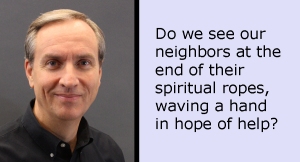 HEARTLAND | Nate Adams
HEARTLAND | Nate Adams
I’ve recently found myself in several different settings where I have been asked to help clarify what Baptists believe, and how those beliefs may be distinct or different from those of other groups. Sometimes the question comes from Christians of another faith background. Sometimes it’s from a non-Christian who wants to understand if his or her perception is accurate. Occasionally, those from a different Baptist denomination simply want to understand why all Baptists aren’t alike.
I have to admit, dialoguing with that latter group sometimes has made me wonder if we Baptists aren’t too quick to stand apart from one another, or to divide into different groups over relatively minor issues. But in most cases, looking for the reasons that we stand apart as Baptists makes me glad that we do.
Late last year, my more frequent conversations along these lines led me to set aside 18 weeks of our weekly chapel at the IBSA building, and to devote one week to each of the articles in The Baptist Faith & Message. We only have 30-45 minutes for chapel, which includes worship and prayer. So we did not do an in-depth study. But each week, I asked the staff to look at a different article from The Baptist Faith & Message, and to ask with me, “What is distinct here? How are Southern Baptists different from other groups, even other conservative, Christian groups?”
Our staff agreed it was a helpful and enlightening exercise. Often we found ourselves saying, “Well, many Christians believe that, or certainly most conservative or evangelical Christians would say something similar to that.” But every week, on almost every doctrinal topic, we also found ourselves identifying distinct beliefs or practices that make our Baptist faith and message meaningfully unique.
After the chapel series was over, I sat down with my notes and jotted my own personal summary of the Baptist beliefs that, to me, seem to differentiate Baptists from others. This list will help me summarize our Baptist identity when I am asked to do so. And, with great love and respect for my many Christian and evangelical friends from other denominations, these are the reasons I will always look for a Baptist church when I move to a new town, or when I choose to declare a doctrinal identity.
My list didn’t simply include a high view of Scripture, or faith in Jesus as the only way to salvation, or a literal resurrection and second coming, because many Christians share those beliefs. But it did include things like believer’s baptism, by immersion and symbolic. It included local church autonomy and congregational governance, combined with passionate, organized cooperation in missions. And it included belief in eternal security, biblical marriage, and personal responsibility for evangelism.
This rich discussion of “What does it mean to be Baptist, and does it really matter?” has also contributed to the creation of a new feature, beginning in this issue of the Illinois Baptist. You will find it on pages 9 and 10. This new “Baptist 101” section will help clarify and reinforce what it means today to be Baptist, not just doctrinally, but also in cooperative missions endeavors and practical church matters. In fact, I hope it will help all of us who read the Illinois Baptist become more articulate proponents of Baptist, evangelical, Christian faith.
Of course the autonomous nature of Baptist churches and people makes it impossible, even undesirable, to try and paint everyone with the same broad stroke. Baptists are a diverse group! But while we are not uniform, we are strangely, almost miraculously, unified. Our best understanding of the Bible has led us to stand, with humility and respect for others I trust, on core Baptist beliefs and practices. If we believe these are important enough to protect and
preserve for our children and grandchildren, then we must continue to understand them and articulate them for others. Across the centuries, and I believe now and into the future, Baptist faith matters.
Nate Adams is executive director of the Illinois Baptist State Association.
 HEARTLAND | The kids have gone back to school, so now let’s go back to church. That’s the idea behind National Back to Church Sunday, September 20. After Labor Day is one of those times when the number of church visitors increases. How can we prepare?
HEARTLAND | The kids have gone back to school, so now let’s go back to church. That’s the idea behind National Back to Church Sunday, September 20. After Labor Day is one of those times when the number of church visitors increases. How can we prepare?






 What’s a little more unusual is that my wife, Beth, is traveling with me. Our youngest son Ethan is leading the worship team at our home church in Springfield, and Beth would like to be there too. But by evening we will be at the church where our middle son Noah is youth pastor, and so she has decided to come along. So it’s already an especially good Sunday.
What’s a little more unusual is that my wife, Beth, is traveling with me. Our youngest son Ethan is leading the worship team at our home church in Springfield, and Beth would like to be there too. But by evening we will be at the church where our middle son Noah is youth pastor, and so she has decided to come along. So it’s already an especially good Sunday.





